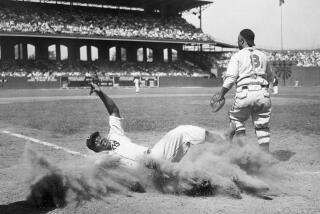‘42’ director: I didn’t soft pedal racially charged language
- Share via
Brian Helgeland, writer and director of the Jackie Robinson biographical film “42,” expected his new movie would get an R rating from the Motion Picture Assn. of America.
After all, the film, which was produced by Legendary Pictures and is being released by Warner Bros. Friday, is filled with coarse, racially charged language. In the picture, a variety of slurs are directed at the famed Brooklyn Dodger who was the first African American major leaguer. Most pointedly, he is called the N-word many times.
“In my eyes if we had come back an R, then we were an R,” Helgeland said in a telephone interview Friday morning. “We weren’t going to try to soft pedal it.”
The film stars Chadwick Boseman as Robinson and Harrison Ford as Branch Rickey, the Dodgers general manager who signed the baseball player to the team. “42” was rated PG-13 for “thematic elements including language.”
“I was expecting it to come back R, and it came back almost immediately PG-13,” Helgeland said. “My sense of it was, if it had been a fictional film it would have been R.”
Robinson began his Dodgers career in 1947. He was the subject of taunts and threats from spectators and opponents alike.
During the 1947 season, Robinson was subjected to brutal treatment from Philadelphia Phillies manager Ben Chapman over the course of a series between the Dodgers and the Pennsylvania team. This is shown in a roughly eight-minute sequence during which the Chapman character, played by Alan Tudyk, calls Robinson the N-word dozens of times.
Helgeland said that extras who were on hand for the filming of those scenes were affected by the language. “To see it land on them was a strange experience. ... Love scenes can be awkward to shoot, but this was more awkward,” he said. “For the actors, although it was difficult, they had been preparing for it for weeks.”
The filmmaker opted to not rehearse the scenes that make up the Chapman sequence. “We felt it wasn’t really rehearsable,” said Helgeland, whose screenwriting credits include “L.A. Confidential” and “Man on Fire,” among other films. “That was the assault on [Robinson] and I thought we had to show it in a violent way. Those words had to be violent. If we trivialized it, some people might say, ‘Oh, he didn’t have it so bad.’”
PHOTOS: Game-changing baseball movies
Helgeland said that while the sequence was being edited, “someone said it made them feel uncomfortable” and recommended that the filmmaker trim down the use of the racial slur. “My reaction was that it made Jackie Robinson feel uncomfortable too. I basically just trusted my own instinct,” Helgeland said.
In addition to the Chapman sequence, the racial slur is used 16 other times in the film, by this reporter’s count. There are also other epithets, including some directed at Jewish and Italian characters.
The use of the N-word in cinema has been a contentious issue in recent months. Last year’s “Django Unchained” used the word many times, drawing the ire of some. Wholly different from “42” in terms of content, tone and subject, Quentin Tarantino’s “Django” is the fictional account of a former slave who seeks to free his enslaved wife from a cruel plantation owner. The film was rated R for graphic violence, language and nudity.
According to an MPAA spokesman, the organization does not have a specific rule on the use of the N-word; instead its usage is considered within the context of each film that the MPAA Ratings Board reviews.
ALSO:
Jackie Robinson film ‘42’ capitalizes on Dodgers for promotion
For ‘42,’ actor had to please Jackie Robinson’s No. 1 fan
‘42’ star: Jackie Robinson pic shows we’re ‘evolving as a race’
More to Read
Only good movies
Get the Indie Focus newsletter, Mark Olsen's weekly guide to the world of cinema.
You may occasionally receive promotional content from the Los Angeles Times.











